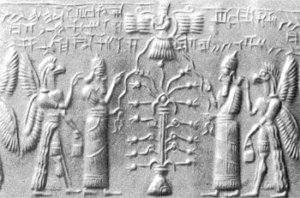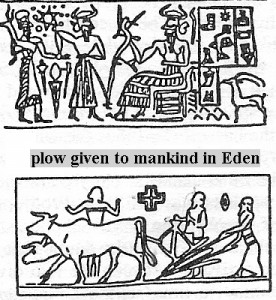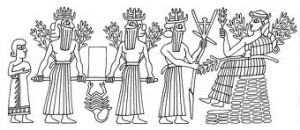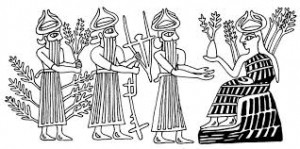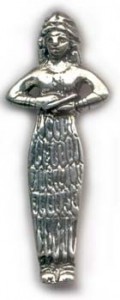The Electronic Text Corpus of Sumerian Literature
(Texts: All Artifacts, Color Coding, & Writings in Bold Type With Italics Inside Parenthesis, are Added by Editor R. Brown, not the Authors, Translators, or Publishers!)
(gods in blue …mixed-breed demigods in teal…)
After the flood had swept over and brought about the destruction of the countries;
when mankind was made to endure,
and the seed of mankind was preserved and the black-headed (earthling) people all rose;
(Apkulla / pilot, Enki, King Anu in his sky-disc, Enlil, & winged eagle-headed pilot / Apkulla, faceless minor god)
when An (Anu) and Enlil called the name of mankind and established rulership,
but kingship and the crown of the city had not yet come out from heaven (Home Planet Nibiru),
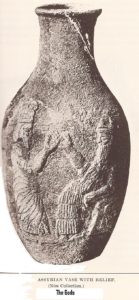 (Ninurta, King Anu‘s successor following father Enlil, & Enlil seated)
(Ninurta, King Anu‘s successor following father Enlil, & Enlil seated)
and Nin-jirsu (Ninurta)had not yet established for the multitude of well-guarded (?) people
the pickaxe, the spade, the earth basket and the plow, which mean life for the Land —
in those days, the carefree youth of man lasted for 100 years and,
following his upbringing, he lasted for another 100 years.
However, he did not do any work.
He became smaller and smaller, ……; his sheep died (?) in the sheepfold.
In those days, because the water of Lagac (Lagash) was held back, there was famine in Jirsu.
Canals were not dug, the levees and ditches were not cleaned.
The large arable tracts were not ……,
there was no water to irrigate abundantly all the cultivated fields: the people relied on rain;
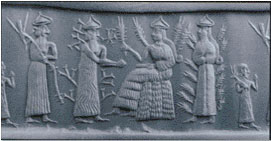
(Enlil, Haia, Nisaba, Ninlil, grain god & goddess, & unidentified mixed-breed with dinner)
Acnan (Nisaba, Goddess of Grains) did not make dappled barley grow,
furrows were not yet opened, they bore no yield; the high plain was not tilled, it bore no yield.
None of the countries with numerous people libated emmer beer,
liquor, ……, sweet liquor or …… for the gods.
They did not till large fields for them with the plow.
10 lines missing
…… the canal. …… its (?) fields.
In order to dig canals, to clean the levees and ditches,
to …… the large arable tracts, to …… all the cultivated fields,
he established for the people the pickaxe, the spade, the earth basket,
and the plow, which mean life for the Land.
Then he turned his attention to making barley sprout.
He made the people stand before the maiden,
and they raised their heads day and night, at the appointed times.
Before Acnan (Nisaba) who makes the seeds grow,
they prostrated themselves and she made them grow (?).
(unidentified, Haia, Ningirsu, Enlil, & Nisaba, Enlil‘s in-laws)
Before (?) Acnan who makes the dappled barley grow, they ……
33 lines missing or uncertain
…… acted for …… years.
…… dug the canal ……, he acted (ruled as king) for 2760 years.
En-akigalaguba: his personal god was ……,he dug the canal Nijin-jic-tukuam, he acted for 1200 years.
In those days there was no writing, ……, canals were not dug, earth baskets were not carried.
In those days, ……, the people …… offerings of refined gold
2 lines uncertain
a good shepherd rose over the Land; he gave them (?) …… as a gift.
En- Ninjirsu-ki-aj, the son of En-akigalaguba: he acted for 1320 years.
En- Enlile-ki-aj, the son of En- Ninjirsu-ki-aj: he acted for 1800 years.
Ur- Bau the son of En- Enlile-ki-aj: he acted for 900 years.
A-gal: his personal god was Ig-alim (Ninurta’s son), he acted for 660 years.
Kue (?), the son of A-gal: he acted for 1200 years.
Ama-alim, son of Kue (?): ……, he acted for 600 years.
12 lines unclear or missing, the lines list further rulers with unrecoverable names and length of rule.
2 lines missing
he dug the Mah canal, the …… canal, the Pirijgin-jen canal, the …… canal,
the Pirij canal at the mouth of the Lugal canal,
the Gana-hili-ana canal, the …… canal, and the Nance-pada canal.
To care, single-handedly, for the great arable lands,
he dug irrigation ditches and ……, he acted for 2220 years.
Ur- Nance, the son of ……, who built the E-Sirara (Nanshe’s), her temple of happiness
and Nijin, her beloved city, acted for 1080 years.
Ane-tum, the son of Ur- Nance, in whose …… place the gods stood, who …… the land register of great Enlil:
his personal god was Cul-utul (unidentified?), he acted for 690 years. ……,
the son of Ane-tum: he acted for X+360 years.
En-entar-zid: his god was Mes-an-du (unidentified?), of the seed of ancient days,
who had grown together with the city, he acted for 990 years.
……, the son of En-entar-zid: he dug the canal Urmah-banda,
and the canal Tabta-kug-jal, his personal god was Mes-an-du (unidentified?);
his master Nin-jirsu (Ninurta) commanded him to build his temple; he acted for 960 years.
En- Enlile-su: he acted for 600 years.
……, the son of En- Enlile-su: his personal god was Ninazu ; he acted for 660 years.
……: he acted for 1110 years.
Puzur- Ninlil: he acted for X x 60 + 1 years.
En- Mes-an-du (?), the son of Puzur- Ninlil: his personal god was ……, he acted for 120 years.
Dadu, the son of En- Mes-an-du (?): he acted for 160 years.
Tuggur, the son of Dadu: he acted for 160 years.
……: he acted for 120 years.
Puzur- Mama, the scribe of Ninki (Enki’s official spouse):
his personal god was Zazaru (unidentified?); he acted for …… years.
Lamku-nijgena (?), the administrator of Puzur- Mama,
who built the wall of Jirsu, his ……, and the Tirac palace in Lagac (Lagash): he acted for 280 years.
Henjal, the son of Lamku-nijgena (?): his god was Pabilsaj (Ninurta) (?), he acted for 140 years.
……, the son of Henjal: he acted for 144 years.
Ur- Ninmarki (named after Ninmarki), the scribe and scholar: ……,
his personal gods were Haya (Haia) and Nisaba (Haia‘s spouse), he acted for X + 20 years.
Ur- Ninjirsu, the son of Ur- Ninmarki: he acted for X x 60 years.
Ur- Bau, the scribe of Ur- Ninjirsu, who …… in the assembly: he acted for X + 30 years.
Gudea (Ninsun’s 2/3rds divine son-king), the younger brother of Ur- Bau, ……,
who was not the son of his mother nor the son of his father: he acted for …… years.
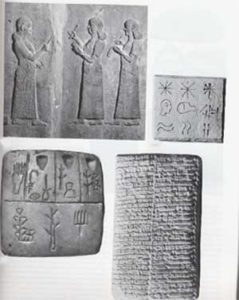 (Nisaba, Enlil‘s mother-in-law)
(Nisaba, Enlil‘s mother-in-law)
Written in the school.
Nisaba be praised! (Goddess of Grains, & Master Scribe, Author to many texts)
